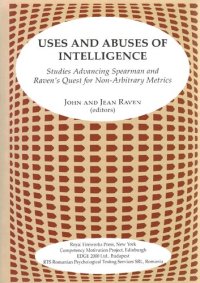
Ebook: Uses and Abuses of Intelligence: Studies Advancing Spearman and Raven's Quest for Non-arbitrary Metrics
- Genre: Psychology
- Publisher: Competency Motivation Project
- Language: English
- pdf
Several chapters provide evidence supporting the use of Raven's Progressive Matrices in research. These chapters demonstrate that the psychological construct "meaning-making ability" is, from a scientific point of view, every bit as secure as "hardness" in the field of mineralogy. The test works - scales - in nearly the same way in most cultures and sub-cultures. Cultural differences and change in performance across generations must, therefore, be explained, not dismissed. Other chapters show that most of the commonly proffered explanations for these differences simply do not stand up to scientific analysis.
The insights that emerge are not limited to work with the Progressive Matrices. It is made clear, for example, that fundamental problems exist in current approaches to the measurement of change in human abilities. Most conclusions drawn from intervention outcome studies comparing treatment effects in the "more" vs. "less" able (e.g., educational enrichment programmes) are, it emerges, fatally flawed.
Other chapters reprise Spearman's critique of the dominant measurement paradigm in psychology. Spearman understood that a factorial model of ability was inadequate, noting that "every normal man, woman and child is a genius at something" but that this could not be demonstrated using tests developed within the current psychometric framework. Likewise, he noted that the tests from which his g had emerged "have no place in schools" because they do not recognise the diverse talents that teachers have a responsibility to nurture.
Other chapters show that most evaluations of people and programmes (and sometimes used to promote "evidence based treatments") are both unscientific and could even be considered unethical. The core problem is that we currently pay too little attention to the comprehensiveness of assessments.
Chapters concerned with these issues develop an alternate framework which captures variance that is typically lost, and summarise research showing how a diversity of talents can nurtured, recognised, and utilised in developmental environments in homes, schools, and workplaces.
Para breaks (hard carriage returns) are not showing up in preview.